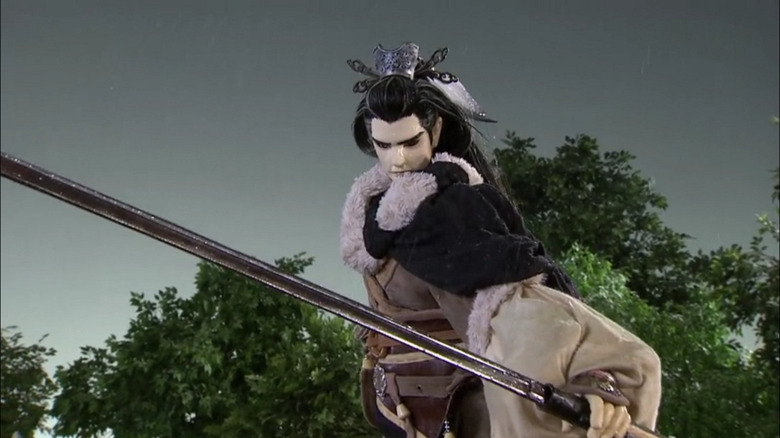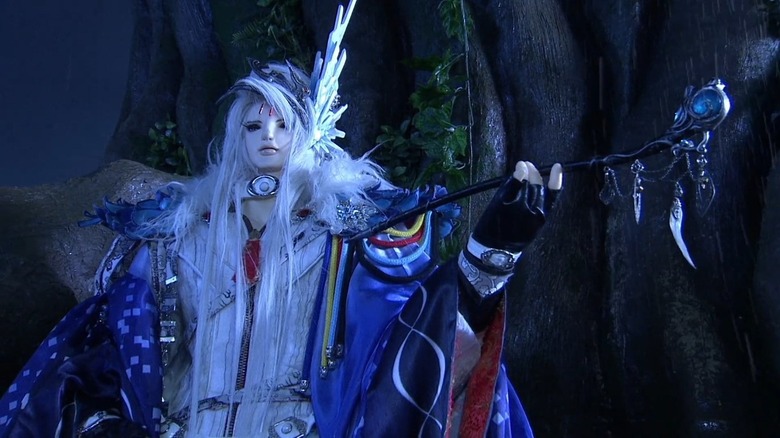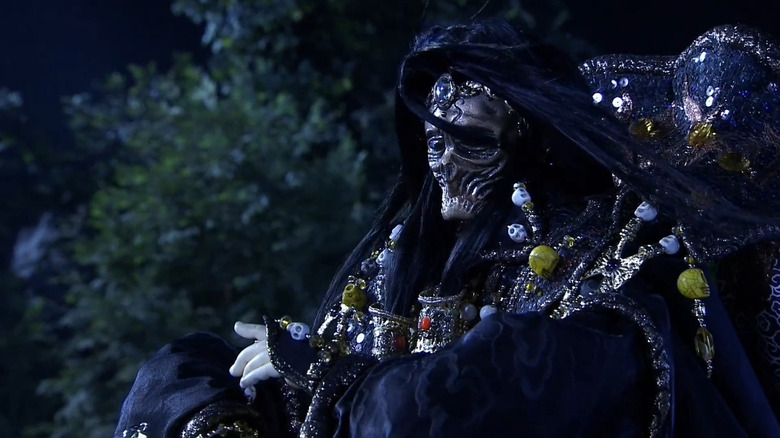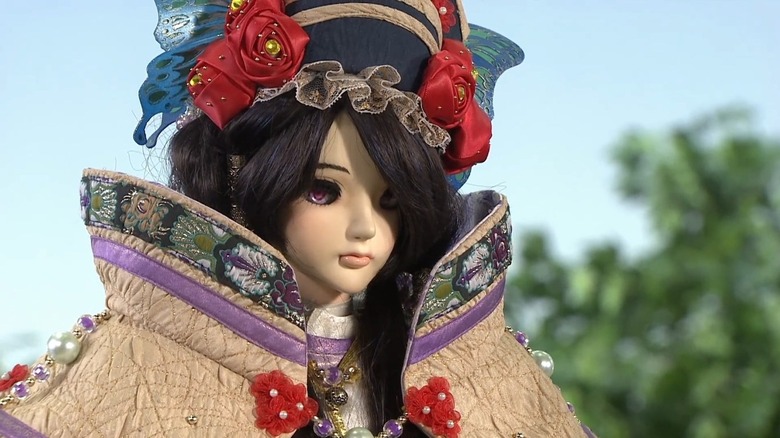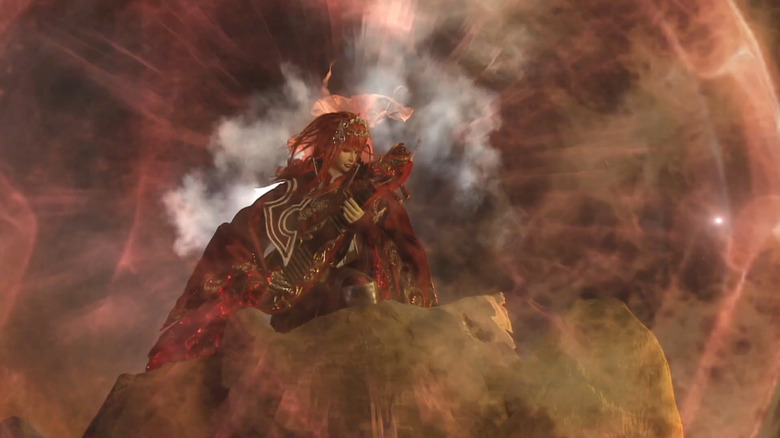The Daily Stream: Thunderbolt Fantasy Is The Best, Bloodiest Puppet Show On Earth
(Welcome to The Daily Stream, an ongoing series in which the /Film team shares what they've been watching, why it's worth checking out, and where you can stream it.)
The Series: "Thunderbolt Fantasy"
Where You Can Stream It: Crunchyroll
The Pitch: In the land of Dong Li, a wandering swordsman named Shang Bu Huan saves the holy priestess Dan Fei from the cruel Xuan Gui Zong martial arts clan. Shortly after, Bu Huan is recruited by Gui Niao, a mysterious trickster, to join a company of heroes. Their mission, together with Fei, is to break into the fortress of power-hungry swordsman Mie Tian Hai (leader of the Xuan Gui Zong) and retrieve the stolen piece of the demon-sealing sword known as the Tian Xing Jian.
Yet mysteries remain. Who is Gui Niao, if that is even his real name? Why does his team of "heroes" include a cruel necromancer as well as a man who is literally named "Screaming Phoenix Killer?" Could Bu Huan himself conceal a hidden past, abandoned across the desert in the western nation of Xi You? In this exuberant martial arts tale, blood will be spilled and demons slain. Schemers will compete for magical swords. The dead will walk. Not to mention, everybody is a puppet!
Why it's essential viewing
"Thunderbolt Fantasy" combines two great flavors that, unexpectedly, taste great together. The first is Gen Urobuchi, a former porn game writer who became famous in the anime industry for his violent and suspenseful science fiction screenplays. His best-known work includes the magical girl horror series "Mahou Shoujo Madoka Magica," the indulgent cyberpunk police thriller "Psycho-Pass" and "Fate/Zero," the prequel to the now-megalithic "Fate" franchise of anime and video games. The second is Pili International Media, a Taiwanese company that produces puppet dramas. Descending from the Chinese art of Budaixi (glove puppetry,) the Huang family adapted the form to TV beginning in 1984. Their dramatic original storylines, together with the highly detailed puppetry and special effects, led to its pride of place as one of Taiwan's most famous cultural institutions.
By sheer chance, Urobuchi came across a Pili display at a convention and was compelled to seek out the franchise on his own. Urobuchi could not understand Taiwanese or read Chinese subtitles, but he was enthralled simply watching the puppets move and fight on screen. Not to mention that both Pili puppet dramas and Urobuchi himself are infamous for their tragic death scenes. Pili themselves noticed Urobuchi was watching their output via social media, and anime fans on staff were savvy enough to know they had an opportunity on their hands. So Urobuchi and representatives at the Pili company came together to produce "Thunderbolt Fantasy," a series meant to introduce audiences in Japan, China, and elsewhere to state-of-the-art Taiwanese puppetry.
The land is cloaked in deepest blue
"Thunderbolt Fantasy" represents a unique opportunity to experience an art form completely outside the realm of experience for many English-speaking viewers. It's also fun as heck. The first episode gives us bloody martial-arts beat-downs, dramatic readings of Chinese poetry, and the ever-dramatic Gui Niao (whose true name is Lin Xue Ya) trolling the long-suffering Shang Bu Huan. It ends with an underling of Mie Tian Hai being so distraught by his defeat at the hands of the heroes, that he decapitates himself so that a skeleton bird may deliver his head into the hands of his boss. The series only becomes more extravagant from there. The show's energy is heightened even further by the music of Hiroyuki Sawano, a Japanese composer whose non-stop power chords and eclectic English lyrics are a perfect fit for the bombast of "Thunderbolt Fantasy."
"Thunderbolt Fantasy" also represents the absolute best of Gen Urobuchi as a writer. The plot is propulsive and moves with efficiency. While the story is a classic tale of good versus evil, Urobuchi gives the cast a real sense of moral ambiguity. Shang Bu Huan is a likable good guy and Dan Fei a pure-hearted warrior, but Lin Xue Ya is a thief and nearly every other member of the cast is either plotting with him or against him. The second half of the series transforms into a pretzel of conspiracies where everybody is trying to scam everybody else. Urobuchi has always nursed a grudge against self-righteous heroism, and "Thunderbolt Fantasy" finds new and entertaining ways to skewer its cast of hypocrites throughout the series. Even Bu Huan must grapple with the costs of his idealism, despite his humility otherwise protecting him from punishments that other characters must bear.
A shadow of eagles across the moon
The first season of "Thunderbolt Fantasy" is an excellent, self-contained action series with a strong beginning and end. But the success of "Thunderbolt Fantasy" led to the birth of a franchise that now includes three seasons and two movies, with even more on the way. These successors expand on Shang Bu Huan's past and introduce a whole new squad of powerful killers and thieves from the land of Xi You. Viewers should prepare for some real curveballs; not only does Urobuchi write a character from his shared tabletop campaign into the story as a recurring villain, but he gives a starring role to theme song performer Takanori Nishikawa (T.M. Revolution) as Shang Bu Huan's buddy in arms. This leads to a scene in which Nishikawa's puppet defeats a dragon by loudly singing the theme song while wailing on his talking sword instrument. It is incredible.
Unfortunately, as the story becomes more complicated, Urobuchi's bad habits begin to bleed into the narrative. As disciplined as he can be as a pulp storyteller, Urobuchi has a reputation for misogyny that's dogged him ever since his script for "Madoka Magica" transformed the young adult drama of "Sailor Moon" into a Lovecraftian horror story. Dan Fei escapes this fate in the first season of "Thunderbolt Fantasy" simply because the story moves too quickly to handle her in anything but generalities. But by the second season, newly introduced female characters like the Princess of Cruelty are once more subjected to terrible (and gratuitous) fates. Urobuchi fans argue that throughout his body of work, not just women but everybody is doomed to defeat or torture by their hubris. This may be true, but as of now, I prefer the primary colors of the first season to the muddier waters of the second and its sequels.
Endure the pain it's easy now
However you choose to experience "Thunderbolt Fantasy," there is no denying that the series is a rarity on the international stage. Urobuchi could have taken the money that he received for writing "Madoka" and "Psycho-Pass," and coasted for the rest of his life farming his ideas out to third parties. Instead, he teamed up with a locally renowned Taiwanese puppet studio to spread awareness of their output around the world. "Thunderbolt Fantasy" is the definition of a niche passion project, but it's earned itself multiple seasons, a dedicated fanbase, and even a hilarious crossover with the popular phone game "Fate/Grand Order."
Best of all, Netflix released a season of the Pili franchise itself on their service, a remake of a popular earlier storyline titled "PILI Fantasy: War of Dragons." I found the first episode to be unintelligible, as I was likely missing context from earlier seasons that might have helped to explain the characters and their motivations. But I still find myself moved by the fact that an art form that was once completely obscure in English-speaking companies earned itself a chance at a faithful English translation through the hard work of its staff and its foreign fans. I hope that one day the remainder of Pili's work wins the exposure that the studio deserves. In the meantime, I breathlessly await the continuing adventures of Shang Bu Huan, his "vape wizard" rival, and their bloody, beautiful battle against the forces of evil.
